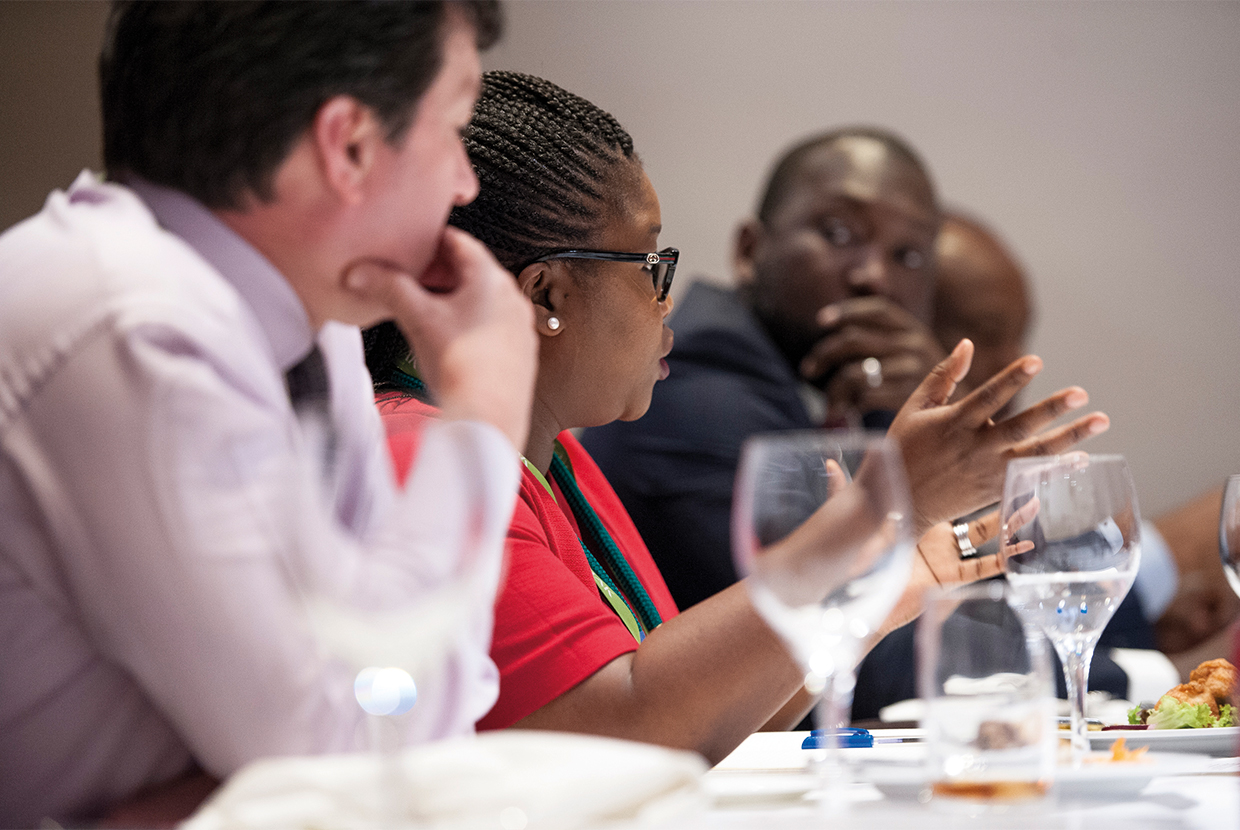The sidelines of GTR Africa Trade Finance Week 2017 in Cape Town provided the setting of the annual GTR Africa roundtable, which this year focused on the positive outlook for the continent.
Roundtable participants:
- Robert Besseling, executive director, Exx Africa
- Gabriel Buck, managing director, GKB Ventures
- Simon Cook, partner, Sullivan & Worcester
- Jean Craven, executive director, Barak Fund Management
- Vernon Darko, president and founder, Equip XP
- Edward George, country head, Ecobank UK representative office and head of group research, Ecobank (chair)
- Bo Masole, CEO, Victus Global, and co-founder, Victus Global Capital
- Lodewyk Meyer, partner, Hogan Lovells (South Africa)
- Benson Oraelosi, managing director, CEO, WAMU zone (Francophone West Africa), Diamond Bank
- Matthew Shires, managing director, Eurofinsa (UK) Limited
- Charles Weller, managing director, Africa trade, Barclays Africa
George: I’ve been struck by the positivity of the message about Africa throughout GTR Africa Trade Finance Week. Despite the fact that this year there are just as many challenges as last year, all of the discussion seems to be about what we’re actually doing about making business happen there. There is a very positive outlook for Africa. Would you share that opinion with me?
Weller: Let me focus on my home territory in Nigeria. Two years ago, Nigeria went into shock. It was in intensive care. Since then, we have bolted the pieces back together, and it is learning to walk again, in a very simple description. I think we’ve had time over the last 24 months to assess the problems. Banks’ credit teams now say: “We’ve been here before. It’s not as bad as we thought it could be and, at the end of the day, we all want to do business, so we are finding ways to make it work.” I think that was a message that came out repeatedly throughout the conference. People are finding ways to get deals done and make things work and accept the risks that we’re facing.
Craven: Two or three years ago, there was a lot of hype around the continent and we’ve seen a lot of inflows, on the private equity side especially, and a lot of funds entering the market. With what has been happening in the commodities markets, a lot of the currencies have gone haywire, but the dust has started to settle and I think people accept the continent and the risks for what they are, and they are getting around it. I think a lot of that hype has gone. Perhaps private equity yields aren’t as high as everyone reported, but there is always a big demand for capacity and capital. The yield is still exciting and I think that is still what attracts people to the continent. There are risks but there are ways to manage these risks. The reality is that people are just getting on with business.
George: I wonder if we’ve moved on from ‘Africa Rising’ back to the ‘Africa Opportunity’, because the bottom line is that there’s a massive opportunity there and a demand for it as well.
Masole: From our perspective, we recognise the risk and we recognise the challenges, but African businesses and businesspeople are very resilient. We know our continent, we know how to get around these challenges, and so for us these are exciting times. We have worked out what it is you need to do at a grassroots level, and we see this continent as an opportunity.
Darko: A lot of people have been sitting on the sidelines, just waiting. And when you’re sitting on the sidelines even for a while, sometimes you need to do something. So people are getting more creative in how they enter the marketplace. The likes of Cargill and even some of the oil and gas firms are offering terms which they wouldn’t offer before. They are getting creative in ways to get back in, because they see the potential. The needs are still there because they can’t produce on the ground.
Shires: The market is very much more fragmented than it has been. One thing we have found is that you have to be much more flexible and focused in your approach in trying to find that appetite to support you. It can be found, but it’s sometimes a challenge.
Besseling: I’ve always been sceptical about the narrative of ‘Africa Rising’. It assumes a huge opportunity like the Asian Tigers in the 1990s, or China over the past 20 years or so. It does not take into account that, first of all, Africa is 54 countries, with different cities and different regions and provinces, ethnicities, religions and languages. It is far more complex.
Oraelosi: If you need to do business in Africa, you need to understand the country you are going to do business in; you need to understand the political perspective of that country, the economic perspectives, and other challenges, and even the neighbours of the country you want to do business in. The challenges that some parts of Africa are having today have existed in Europe and in other parts of the world. And the same way they overcame them, the same way investment did not leave because they believed in the future, is the same way they should be believing in parts of Africa.
Buck: I’ve had the privilege of working in this industry for over 25 years, and I have never done two transactions the same. Actually, across Africa, I’ve never lost money. In terms of the differences in one country, between regions, between the towns and between countries, the reality is that, for each of those challenges, there is a structural solution. Once you’ve got that structural solution in place, there is plenty of funding. I cannot think of a project that doesn’t get concluded, so long as you do ensure that the various stakeholders all have an equity in terms of that transaction. And when you have that, however complex, whatever challenges that particular sector may have, the project gets done.
George: In my view, Nigeria and South Africa, which are in difficult positions economically, have taken way too much of the press. I know they are the two largest economies, but there are countries like Senegal, Tanzania, Ivory Coast, Rwanda and Ghana, all growing at 6% or more. There are phenomenal poles of growth there.
Meyer: I think there is better consensus that now is the time to be going in and doing business, because the opportunity for upside is certainly there.
Craven: If you can make it work now, it will work for a long while. There is not a lot of downside left, given where the economies are and the currencies.
Weller: For the likes of Nigeria and South Africa, these are not going to be the last crises. We are coming out of it again, and it will peak, and there will be another issue around the corner, whether it’s commodities, whether it’s oil, whether it’s something else. It’s a case of managing that turmoil, and being flexible enough to adapt to the country you’re doing business with. We recently sat down with a large organisation in Lagos, and they said to us, if you come here with a Western matrix of compliance and rules and regulations, and you try and lay that on to Nigeria, it will never fit. You’ve got to adapt to the market.
Buck: There are many European countries who would dream of having debt to GDP levels that most African countries have got. Nigeria is only at 14% at the moment; they are grossly under borrowed.
Weller: That is one of my criticisms of Africa, as a broad brush statement. Africa does not promote itself boldly. It doesn’t take much for a group of senior Nigerian businessman to get together and go and market Nigeria in the UK, in Boston, in New York,
in Singapore, for example.
Masole: I always say that all roads lead to Africa. Recently, a European client of ours was having a problem with sourcing chillies from China, and I said, well, go to Africa. We grow a lot of chillies. And they had never thought about that. In agriculture, there isn’t really anywhere else to go but to come here. This is where the world’s uncultivated land is. This is where the youth population is, for a labour-intensive industry. It all leads to here.
Cook: Certainly in London, there is a lot more positivity around Africa now than there has been for a long, long time. And it’s combined with more education about Africa. There’s a lot more knowledge about Africa. Africa doesn’t really sell itself very well in the European context and I assume elsewhere as well. So people don’t know. And unless people are told, they will never know, because there is still a little bit of a perception of Africa being difficult, and so they don’t go and find out for themselves.
George: Do you see geopolitical developments, such as Brexit, as being good for Africa?
Masole: We do, because we see it as a potential opportunity for countries to renegotiate trade deals and tariffs with the UK. In the agricultural industry, we are hoping they will be relooking at some of the legislative requirements that have been put in by Europe, and that levels, for example in fresh produce, will be revisited. It has been very painful in the last 10 years just to see some of the regulations that have come out of Brussels.
Weller: The thinking is that the UK has got to capture in the Commonwealth what it has ‘lost’ in Europe, and we have already seen a concrete example where the department for international trade (DIT) is rolling out a Nigeria/UK trade initiative. It seems to me that it is grasping at straws. Are UK importers and exporters suddenly going to deal with Nigeria because of Brexit? They are not. So, it needs to go further than that. Has Brexit really featured in West Africa as a hot topic? It did for a number of months when it happened, but today, it is old news.
George: One interesting thing from the British perspective on Brexit is that Africa is nowhere on the Brexit agenda. That is the reality. But, the flipside is, the UK government has decided to re-catalyse the CDC, and it looks like the CDC is going to become the key means of the UK engaging in developing markets, and in particular in Africa.
Darko: As a final comment, I would say that Africa is a big market. The whole continent has vast land, vast population, it is a place to be in terms of a fresh market to grow and get margins from, so I see it as a positive place to be, and I would encourage others to do the same.

















